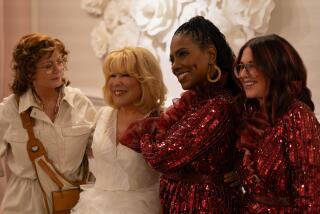This gumbo is simply irresistible
- Share via
It was a fiddle bonanza at the Skirball Cultural Center on Wednesday. The playing of Fiddlers 4, the most intriguing assemblage of similar-instrument all-stars since the Three Tenors (whose instruments, of course, are their voices), brilliantly characterized the Skirball’s new series -- “The World on a String: Fiddles Across Cultures.”
In this case, the four -- fiddlers Michael Doucet, Darol Anger and Bruce Molsky and cellist Rushad Eggleston -- roved freely across the landscape of American vernacular music.
Doucet’s background in Cajun music, Anger’s jazz skills and broad stylistic experience with the Turtle Island String Quartet, Molsky’s mastery of regional styles and Eggleston’s virtuosic, low-register support came together in an irresistibly appealing, surprisingly compatible musical blend.
One highlight followed fast on the heels of another: Doucet’s mix of a Polish mazurka with an Acadian two-step, and his spirited “Atchafalaya Pipeline”; Anger’s “African Solstice,” an insightful reflection on the music he experienced during a trip to Africa; Molsky’s touching rendering of the traditional “A Man of Constant Sorrow”; and Billy Taylor’s classic “I Wish I Knew How It Would Feel to Be Free.”
Add to that a highly idiosyncratic treatment of Duke Ellington’s “East St. Louis Toodle-Oo” (labeled “Todalo” in the Fiddlers’ version), the unlikely combination of “Just a Closer Walk With Thee” and “I Know,” a powerful instrumental duet between Anger and Eggleston, and the riveting vocalizing of both Doucet and Molsky.
An extraordinary evening, in other words -- one heightened by the obvious affection and musical admiration between the players. No wonder their first album, “Fiddlers 4,” has been nominated for a Grammy.
More to Read
The biggest entertainment stories
Get our big stories about Hollywood, film, television, music, arts, culture and more right in your inbox as soon as they publish.
You may occasionally receive promotional content from the Los Angeles Times.








